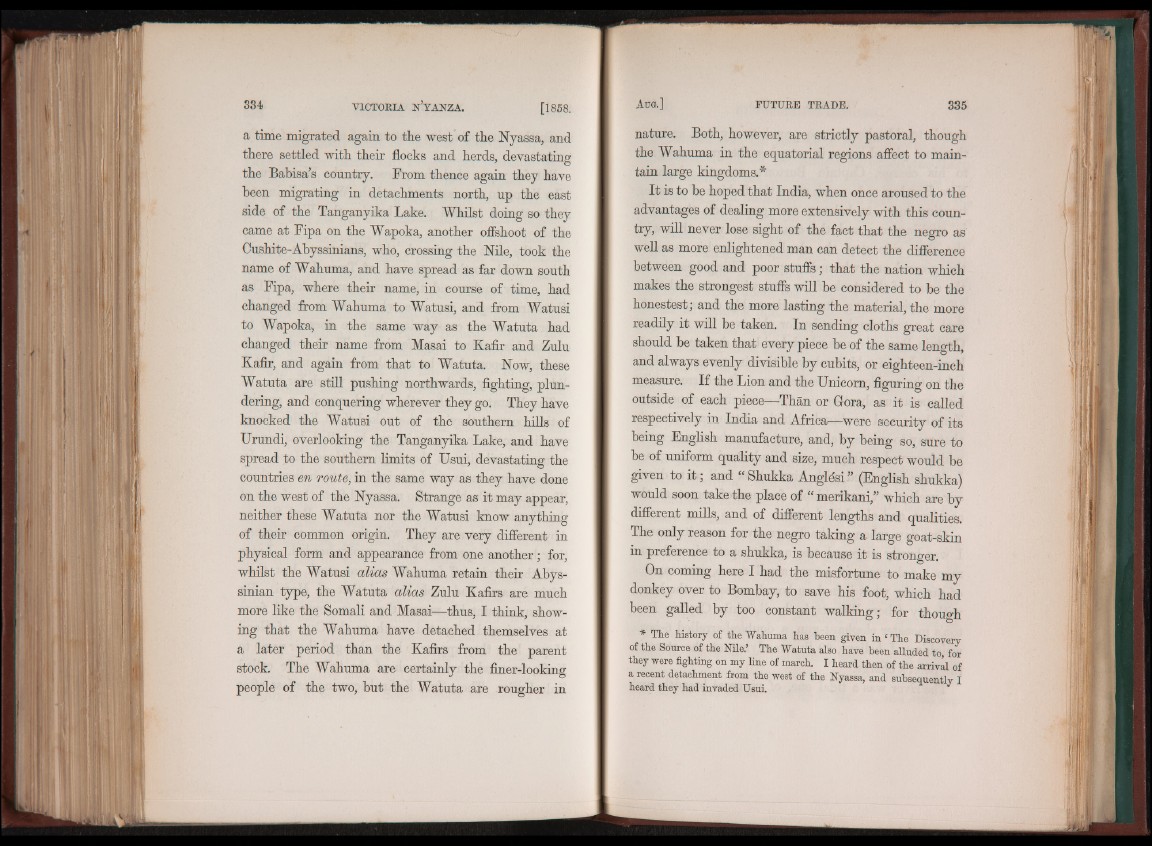
a time migrated again to the west of the Nyassa, and
there settled with their flocks and herds, devastating
the Babisa’s country. From thence again they have
been migrating in detachments north, up the east
side of the Tanganyika Lake. Whilst doing so they
came at Fipa on the Wapoka, another offshoot of the
Cushite-Abyssinians, who, crossing the Nile, took the
name of Wahuma, and have spread as far down south
as Fipa, where their name, in course of time, had
changed from Wahuma to Watusi, and from Watusi
to Wapoka, in the same way as the Watuta had
changed their name from Masai to Kafir and Zulu
Kafir, and again from that to Watuta. Now, these
Watuta are still pushing northwards, fighting, plundering,
and conquering wherever they go. They have
knocked the Watusi out of the southern hills of
Urundi, overlooking the Tanganyika Lake, and have
spread to the southern limits of Usui, devastating the
countries en route, in the same way as they have done
on the west of the Nyassa. Strange as it may appear,
neither these Watuta nor the Watusi know anything
of their common origin. They are very different in
physical form and appearance from one another; for,
whilst the Watusi alias Wahuma retain their Abyssinian
type, the Watuta alias Zulu Kafirs are much
more like the Somali and Masai—thus, I think showing
that the Wahuma have detached themselves at
a later period than the Kafirs from the parent
stock. The Wahuma are certainly the finer-looking
people of the two, but the Watuta are rougher in
nature. Both, however, are strictly pastoral, though
the Wahuma in the equatorial regions affect to maintain
large kingdoms.*
It is to be hoped that India, when once aroused to the
advantages of dealing more extensively with this country,
will never lose sight of the fact that the negro as
well as more enlightened man can detect the difference
between good and poor stuffs ; that the nation which
makes the strongest stuffs will be considered to be the
honestest; and the more lasting the material, the more
readily it will be taken. In sending cloths great care
should be taken that every piece be of the same length,
and always evenly divisible by cubits, or eighteen-inch
measure. If the Lion and the Unicom, figuring on the
outside of each piece—Than or Gora, as it is called
respectively in India and Africa—were security of its
being English manufacture, and, by being so, sure to
be of uniform quality and size, much respect would be
given to it; and “ Shukka Angldsi” (English shukka)
would soon take the place of “ merikani,” which are by
different mills, and of different lengths and qualities.
The only reason for the negro taking a large goat-skin
in preference to a shukka, is because it is stronger.
On coming here I had the misfortune to make my
donkey over to Bombay, to save his foot, which had
been galled by too constant walking; for though
* The history of the Wahuma has been given in ‘ The Discovery
of the Source of the Nile.’ The Watuta also have been alluded to, for
they were fighting on my line of march. I heard then of the arrival of
a recent detachment from the west of the Nyassa, and subsequently I
heard they had invaded Usui.